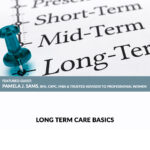Navigating Uncertainty in Today’s Volatile Market
In this episode, financial expert Pamela J. Sams discusses the challenges of navigating a volatile market in 2025. The conversation covers key concepts such as market volatility, managing emotions during investment decisions, and the importance of having a solid investment strategy. Pam emphasizes strategies for long-term investment, the value of diversification, and the psychological impact of global events on personal finance. She also advises on how to prepare retirement plans to weather uncertain times and the implications of federal entitlement programs on individual finances.
Understanding Market Volatility
Market volatility refers to the fluctuations in the stock market, which can be caused by economic data, headline news, interest rates, and emotional investor reactions. It is a normal part of market behavior, akin to turbulence during a flight, and should be seen as a typical course correction rather than a cause for panic.
Managing Emotional Reactions
Investors should acknowledge fear as a normal reaction but should avoid making emotional decisions, which can derail long-term goals. It is crucial to stick to a predetermined investment strategy and tune out sensational media that may heighten emotional responses.
Investing During Uncertainty
Timing the market is difficult, even for professionals. Instead of waiting for stability, investors should focus on staying invested over the long term, as historical data shows that markets reward long-term commitments. Current market dips can be viewed as opportunities to buy stocks or funds at a lower price.
The Role of Diversification
Diversification helps to spread risk across various assets, reducing the impact of a downturn in any single investment. Having a balanced portfolio with different asset classes can provide a cushion against market swings.
Evaluating Investment Strategies
If market swings are causing significant anxiety, it may indicate a mismatch between an investor’s risk tolerance and their portfolio. Regularly rebalancing the portfolio can keep it aligned with investment goals and risk levels.
Avoiding Panic Selling
One of the biggest pitfalls during downturns is panic selling, which can lock in losses and hinder recovery. Historical trends show that markets often rebound faster than expected, and missing key recovery days can drastically affect investment returns.
Adjusting Retirement Plans
For those approaching retirement, adjustments may be necessary, such as increasing cash reserves and employing a conservative withdrawal strategy. It is important to avoid knee-jerk reactions during market volatility.
Impact of Global Events
Global events can lead to short-term market reactions that may not reflect long-term trends. Investors should focus on their personal financial goals rather than react to day-to-day news.
Safe Financial Moves
Investors should build their emergency funds, check their budgets for spending leaks, continue investing wisely, and minimize high-interest debt to fortify their financial situation during uncertain times.
Seeking Professional Guidance
A financial professional can provide an emotional anchor during volatile times, helping clients stick to their long-term goals rather than reacting impulsively to market changes. They offer perspective and accountability in navigating financial decisions.





